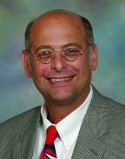Pimp my service
I should have been more nervous. Everyone else on the service was.
I should have been more nervous. Everyone else on the service was. The morose medical student was shuffling through index cards filled with patient histories and lab results. The intense intern had a little notebook out and was turning the pages like he was looking for a lost phone number. The reticent resident tapped her foot against the floor, her heel beating an off-tempo tattoo. And I, the feckless fellow, was cool as a veritable cucumber and could not figure out why.
It was our first day on the Brown service. Brown was not a color. The team was named after the infamous cardiologist, Bartholomew Brown. I did not know much about him, only that he had published and written more books and papers than Michael DeBakey and was a renowned pimpster. I was not sure why I wasn't scared, but the tension was unmistakably high.

My mind drifted back to my childhood in Milwaukee, as it often did when I was somewhere I would rather not be (an all too common occurrence). My father had run Big Bob's Car Clinic. I spent many hours watching him try to keep a variety of ailing cars on the road for a few more thousand miles. He would talk to the driver, trying to get the story straight, and then he would sit and listen to the engine running. Just listening would often give the diagnosis: the jee je je jeeee of a bad clutch bearing, the voooooOOOOOOoooooo of an ailing differential. I loved to watch him work and kept my own eyes and ears open. But he would not let me join the family business. He had decided medicine was for me, and there was no arguing with Big Bob.
Bartholomew Brown strode off the elevator and towards our team. He was a salt-and-pepper-haired, no-nonsense bulldog of an attending. The chart rack was loaded, the information at our fingertips. He sneered at us. “You the new team? Lord preserve us. Let's go.” So we went.
Outside the first room, he turned to the medical student. The young doctor-to-be was ready to present. He had memorized the facts and was ready to spew them out in his best performance. “This 78-year-old man presented with….” He got no further.
“Give me a break,” snarled Dr. Brown. “What's his diagnosis?”
The intern chimed in, his nose ready to get brown for Brown. “I believe it's endocarditis, sir.” Rookie error; never volunteer anything with a pimpster like Brown.
“You believe? How do you make the diagnosis? What's the most common organism? What are the treatment options? What did that article in Heart say last week?” The questions were a barrage, and the intern wilted, then melted, a veritable puddle in a white lab coat.
We examined the patient. Dr. Brown looked at the resident, who had tried in vain to keep a low profile. “What's that murmur? What makes the sound? Who's it named after?” Painful silence from the resident. “Pathetic,” was all Brown said.
Finally he turned to me, his eyes blazing. “So you're the new fellow, huh? Think you know a lot?” I looked at him. I couldn't understand why, but the whole thing seemed funny. I tried not to laugh. “So why don't you edify us? What's the most common fungus to cause endocarditis, fellow?”
I stared at him, unafraid and unwilling to avert my eyes from his beady gaze. I knew the answer to that one, just as I had known the Austin Flint murmur he had pimped the resident over. But for some reason, I did not want to tell him. I briefly thought about asking him if he knew, and if so why he didn't just tell us, but it seemed like the wrong approach. Then it dawned on me. I smiled and in my best faux-Texas drawl said, “Danged if I know!”
He grimaced, then seemed to choke, then made an odd huffing noise. It appeared he was laughing. “Danged if I know; that's a beauty.” For the rest of the month, whenever the pimping got heavy, he would turn to me. Before the question even came out, I replied, “Danged if I know.” He only laughed that first time.
Don't get me wrong. I did not like the man. I saw him shred students and housestaff, making them wish they had chosen a different career. Spirits were broken, but not mine. I was pimp- immune.
I left the hospital late one night towards the end of the rotation. I saw, in the attendings' parking lot, a cherry- condition Mercedes convertible. I knew a 1983 380SL roadster when I saw one. I could guess which person it belonged to, too. Bartholomew Brown strode out of the hospital, king of all he surveyed, and climbed into the convertible. He turned the key; I heard a vorrorrorrrr, and an unmistakable weeeEEEEEEeee. He sat there in his car, staring straight ahead. I strode over.
“Dr. Brown, when was your last tune-up? Had your belts tightened? What's your oil life? Do you know how carburetors work? What's your oil pressure?”
He stuttered.
“Pathetic,” I replied.
He called after me, “Do you know what's wrong with her? Tell me, please.”
Those hours with Big Bob had paid off. With the right words I could be a hero and get a cushy job with Brown's group.
I turned and smiled at him. “Danged if I know,” I said, and wandered off into the sunset.



